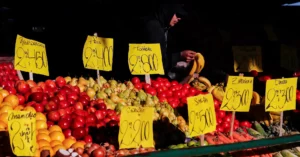[ad_1]
In March, Argentina skilled a notable slowdown in inflation to 11%, but the yr’s cumulative determine climbed to 51.6%.
This data got here to mild in a latest Client Value Index (CPI) report by INDEC.
The report highlights third consecutive month of inflation deceleration following December’s forex devaluation-triggered spike.
Initially, December recorded a staggering 25.5% rise in costs, which eased to twenty.6% in January and additional to 13.2% in February.
Nonetheless, the annual inflation price escalated to an alarming 287.9%, a peak not seen since March 1991.


Moreover, core inflation, which omits fluctuating parts, decreased to 9.4%, hitting single digits for the primary time in 4 months.
The training sector noticed the sharpest enhance at 52.7%, propelled by hikes in tuition charges as the brand new tutorial yr started.
The communication sector additionally confronted a big rise of 15.9%, primarily attributable to greater prices for telephony and web companies.
Utilities together with housing, water, electrical energy, fuel, and different fuels climbed by 13.3%, primarily pushed by elevated electrical energy costs.
In distinction, the smallest modifications had been noticed in eating places and accommodations, up solely 8.3%, and family gear and upkeep, which rose by 5.0%.
Weeks earlier, Economic system Minister Luis Caputo steered that the federal government anticipated March inflation to hover round 10%.
Regardless of precise figures barely exceeding this, Caputo later claimed, primarily based on inside information, that meals costs had been truly deflating in early April.
Analysts, nevertheless, had forecasted March inflation to settle round 12.5%, in response to the Central Financial institution’s Market Expectations Survey.
Wanting ahead, after the Central Financial institution’s latest rate of interest reduce, the way forward for Argentina’s inflation trajectory stays unsure.
The financial institution’s statements point out that core inflation shall be carefully watched, particularly contemplating upcoming changes in regulated service tariffs.
[ad_2]






